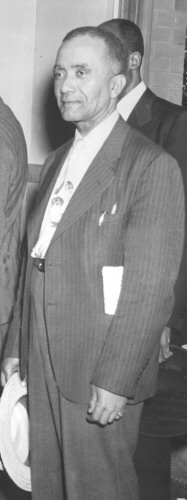A. J. Smitherman, best known as a heroic advocate of self-defense for African Americans in a time of intense racist violence, “A.J.” Smitherman was a leading black political figure in the American West. Born on December 27, 1883, in Childersburg, Alabama, Smitherman moved to Indian Territory with his parents in the 1890s. He attended the University of Kansas and Northwestern University in Evanston, Illinois but later received a law degree from LaSalle University in Philadelphia. Smitherman married Ollie B. Murphy in 1910 and the couple had five children.
Smitherman advocated “self help” and “social uplift” for black Oklahomans. He convinced Tulsa to create a black voting precinct where he was appointed the inspector of elections. Smitherman also cooperated with various governors of Oklahoma on a number of occasions to prevent lynching and rioting. In 1917, when a white mob burned at least twenty African American homes in Dewey, Oklahoma, Smitherman reported the episode directly to Gov. R.L. Williams resulting in the arrest of thirty-six white perpetrators including the mayor of Dewey.
Smitherman learned the newspaper business working for the weekly Muskogee Scimitar. In 1911, he started his own newspaper, the Muskogee Star, and in 1913 he moved to Tulsa and launched the Daily Tulsa Star. Smitherman edited and published the paper at his plant until June 1, 1921, when white rioters in Tulsa destroyed the paper in retaliation for his political activism. In the ensuing pogrom his home and business were burned to the ground and mob rule forced him, his wife, and their five children to flee to Massachusetts. Oklahoma prosecutors attempted to have Smitherman extradited to stand trial for the crime of incitement to riot but Massachusetts never cooperated with extradition efforts. A year later, Oklahoma Klansmen cut off the ear of a relative of Smitherman’s in an act of racial intimidation. Under such circumstances he sold his remaining business interests in Oklahoma to Theodore Baughman, who started the Oklahoma Eagle. Smitherman never again returned to the Sooner state.
In 1925, Smitherman and his family rebuilt their lives as best they could in Buffalo, New York where he reestablished himself in the newspaper business with the Buffalo/Empire Star. There he continued his work as an African American political leader mainly through his journalism for almost four more decades. A.J. Smitherman died in Buffalo in 1961.

